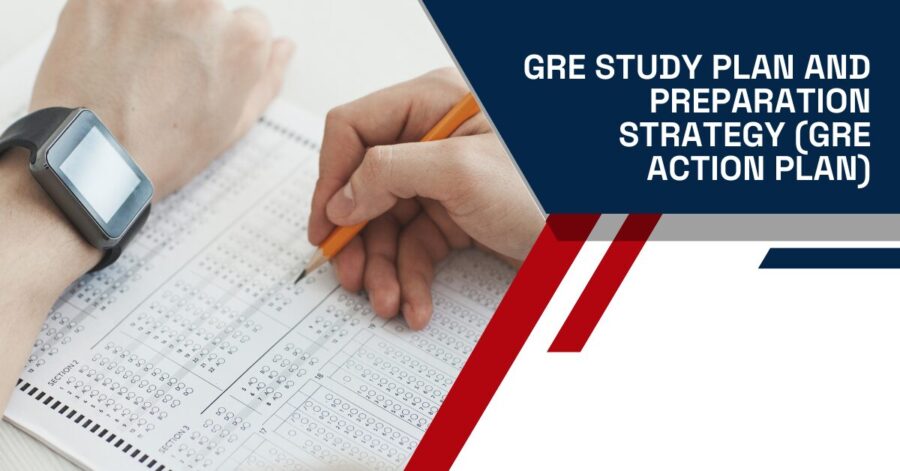17 December 2024
8 minutes read
GRE Study Plan and Preparation Strategy (GRE Action Plan)

Key Takeaways
- Tailor your study plan to focus on your weakest areas and test sections that matter most for your goals.
- Use official GRE materials and simulate test conditions to build familiarity and stamina.
- Efficient time management during both preparation and the actual test can make a significant difference in your score.
Did you know that over 300,000 students worldwide take the GRE each year, yet many struggle to achieve their desired scores? Preparing for the GRE is no easy task—it’s a marathon, not a sprint. You need a really good GRE action plan for this. Students often find themselves overwhelmed by the sheer volume of material, struggling to balance study time with work, classes, or other responsibilities. It’s easy to get lost in the noise, unsure of where to start or how to stay on track.
But here’s the truth: effective preparation doesn’t have to be chaotic. By following a well-structured study plan and adopting a realistic approach, you can significantly improve your chances of success. Get your basics right. Understand whether GRE has negative marking or not. The key lies in understanding your strengths, identifying your weaknesses, and crafting a strategy that works for you—one that fits into your life, rather than taking it over. This blog will guide you through creating a GRE action plan that’s both achievable and effective.
Why Do You Need a GRE Study Plan?
A solid GRE study plan is more than just a nice-to-have; it’s essential if you’re aiming for a competitive GRE score. Start with the very basics like understanding the difference between a GMAT and GRE exam. The GRE test is designed to evaluate your readiness for grad school, and without a structured approach, you risk underperforming in key areas like the verbal section, essay writing, and vocabulary. It’s not just about knowing the content—it’s about mastering the timing, understanding the question types, and building the endurance needed for the actual GRE. You can even create a 10 day study plan for GRE which can be used for final revisions and so on.

Many students mistakenly believe that general test prep or cramming last-minute will suffice, and some even think of whether they need to take a GRE or not. But the GRE is more complex. The verbal section alone demands a strong grasp of grammar and vocabulary, skills that need time to develop. A well-crafted study plan allows you to schedule your study sessions effectively, ensuring you cover all the necessary material and practice thoroughly. Whether you’re also considering the GMAT or solely focused on the GRE, a personalized plan is your roadmap to success and the graduate school admission of your dreams.
What are the Important Considerations for Choosing a GRE Study Plan?
When choosing a GRE study plan, it’s important to focus on what will actually improve your performance on the GRE general test. A good starting point is understanding your strengths and weaknesses in areas like quant and vocab. This helps you create a preparation plan that targets the specific GRE skills you need to develop. Decide whether you need to crack GRE in one month or so, and fix a time frame.
Another key consideration is the type of practice questions you use. While many resources offer practice questions, make sure to incorporate real GRE questions from the official GRE materials. This ensures your plan of action is aligned with what you’ll encounter when you take a GRE. Lastly, your plan should be flexible, allowing you to adjust based on progress and adapt as you get closer to the test date.
Which GRE Section Is More Important?
The importance of each GRE section can vary significantly based on the program you’re applying to. For example, if you’re aiming for a STEM-focused program, the quant section often plays a critical role in admissions decisions. Programs in humanities or social sciences, on the other hand, might place a stronger emphasis on your verbal reasoning and writing scores. Whether you need to crack GRE in 2 months or less, the key lies in prioritizing the right sections.
To determine which section requires more focus, begin by taking a diagnostic test. Analyze the results to identify where you stand relative to the requirements of your desired program. If your quant score is below the typical range for your target schools, prioritize quant in your study plan. Conversely, if your verbal score is lagging, shift your efforts there. Meanwhile, have a clear idea of whether you can write GRE without a passport or not.
Practice problems tailored to your weak spots are key. Don’t just practice broadly; focus on the types of questions that challenge you the most. For example, if data interpretation in quant is tricky for you, allocate more time to those problems. If your reading comprehension in verbal is weak, dive into complex texts and dissect them regularly. Choose the best books for GRE verbal.
How Much Do You Want to Increase Your Score?
When aiming to increase your GRE score, the first step is to determine how much improvement is needed to reach the score possible for your target graduate programs. Start by identifying where you get stuck—whether it’s in quant, verbal, or specific question types like data analysis or reading passages.

To excel, you need to personalize your study plan. Focus on areas where you’re consistently underperforming, and practice until you get comfortable with those question types. For instance, if reading passages slow you down, work on strategies to quickly extract key information. If quant is your Achille’s heels, then start with the best books for GRE quant. The more you tailor your preparation, the more effectively you’ll close the gap between your current performance and your goal score.
How Much Time Do You Have?
The amount of time you have before your GRE test date plays a crucial role in shaping your study plan. If you’re a few months out, you have the luxury of pacing yourself, allowing for deep dives into complex topics like quant or critical thinking strategies for verbal reasoning. If AWA session is bothering you, you have the time to dive deep and look at AWA GRE examples. This is the best time to steadily build your skills without feeling rushed.
However, if your deadline is looming, you’ll need to prioritize efficiently. Focus on high-impact areas that can quickly boost your score, such as mastering key quant formulas or improving your reading comprehension. Remember, while your GRE score is important, balancing your preparation with other aspects of your application, like maintaining your GPA, is essential to meet all your graduate program requirements.
How to Create Your Own GRE Action Plan?
Creating your own GRE action plan starts with a clear understanding of your target score and the requirements of your degree programs. Begin by assessing your strengths and weaknesses through a diagnostic test. Once you identify where you excel and where you struggle, you can tailor your plan accordingly.
For example, if you’re an avid reader and strong in verbal, you might spend less time on that section and more on quant. Conversely, if math isn’t your strong suit, allocate more hours to practice those specific question types. Avoid spending time on unrelated areas that won’t significantly impact your score. Your action plan should be strategic, focusing on improving the sections that will give you the biggest score boost in the limited time you have.
GRE Prep Test Taking Strategies and Tips
To maximize your performance on the GRE, it’s essential to approach your prep with targeted strategies that align with how the admission test is structured. Here’s a breakdown of strategies tailored to different aspects of the GRE:
1. Understand the Adaptive Nature of the Test
The GRE’s quant and verbal sections are adaptive, meaning the difficulty of the second section depends on your performance in the first. Test takers often get stuck in the mindset of answering every question perfectly. However, this can backfire. Focus on getting as many correct answers as possible in the first section without wasting time on questions you find difficult. This sets the stage for an easier second section, allowing you to score higher overall.
2. Prioritize Time Management
Time management is crucial, especially since the GRE doesn’t allow you to return to previous questions within a section. Practice pacing yourself so that you can confidently move through each section. A good rule of thumb is to spend about 1.5 minutes per question on quant and about 1 minute per question on verbal. If you get stuck on a tough question, make an educated guess and move on to save time for other questions.
3. Master the Art of Elimination
On the GRE, especially in the verbal section, the ability to eliminate incorrect answers can drastically improve your chances of choosing the right one. For reading comprehension, quickly eliminate choices that are too extreme, unrelated, or simply do not align with the passage. This strategy is also effective for sentence equivalence and text completion questions.
4. Familiarize Yourself with the Official Question Types
GRE practice is not just about doing as many questions as possible; it’s about doing the right kinds of questions. The GRE has specific question types, such as quantitative comparison or reading comprehension with multiple correct answers. Make sure you’re spending time on official GRE materials, so you’re accustomed to the exact format and style of the questions you’ll face.
5. Simulate the Test Environment
Test takers often overlook the importance of simulating test conditions. When practicing, replicate the conditions you’ll face on test day: timed sections, minimal breaks, and a quiet environment. This helps build the stamina you need to stay focused throughout the actual test and reduces the likelihood of getting stuck on test day due to unfamiliarity with the format.
6. Review and Reflect on Mistakes
After each practice session, review the questions you got wrong or struggled with. Understanding why you got a question wrong is key to improving. Was it a misinterpretation of the question? A gap in your knowledge? Or was it due to poor time management? Analyzing your mistakes helps you refine your strategies and avoid repeating the same errors.
7. Prepare for Test Day Logistics
Finally, make sure you’re prepared for the logistics of test day. Know the location, what you need to bring, and the check-in process. Having all these details ironed out ensures that your focus is solely on performing well. Stress about logistics can throw off your game, affecting your official scores.
Conclusion
Preparing for the GRE requires more than just studying content; it demands a strategic approach tailored to your strengths, weaknesses, and goals. By understanding the test structure, managing your time effectively, practicing with official materials, and refining your techniques, you can maximize your performance on test day. Remember, a well-thought-out plan is your best tool to achieve the scores that will open doors to your desired graduate programs. Start now, stay consistent, and approach your GRE journey with confidence.
Ace Your GRE: Join Ambitio’s GRE Bootcamp and Reach New Heights! Elevate your GRE scores to the top percentile with our expertly designed program, tailored to unlock your highest potential.
FAQs
How early should I start preparing for the GRE?
Ideally, you should start preparing 3 to 6 months before your test date. This gives you enough time to cover all sections, take practice tests, and refine your strategies without feeling rushed.
Should I focus on one GRE section at a time or study them simultaneously?
It’s effective to study them simultaneously, dedicating specific days or weeks to different sections. This keeps your preparation balanced and helps you retain information better.
How many practice tests should I take before the actual GRE?
Aim to take at least 3-5 full-length practice tests. This will help you gauge your progress, build endurance, and adjust your pacing strategy as needed.
Is it necessary to review every question I got wrong in practice tests?
Yes, reviewing your mistakes is crucial. Understanding why you got a question wrong helps prevent similar mistakes on the actual test and strengthens your overall performance.
What should I do if I hit a plateau in my GRE prep?
If you hit a plateau, consider changing your study methods—try new resources, focus on different question types, or adjust your study schedule to maintain motivation and progress.
How do I manage test-day anxiety?
To manage anxiety, practice relaxation techniques like deep breathing, visualize a successful test day, and ensure you’re well-rested. Simulating test conditions during practice can also reduce stress.
Can I improve my GRE score in the final two weeks before the test?
Yes, the final two weeks are crucial for focused practice, reviewing weak areas, and fine-tuning your test-taking strategies. However, avoid cramming and prioritize quality over quantity in your studies.

You can study at top universities worldwide!
Get expert tips and tricks to get into top universities with a free expert session.
Book Your Free 30-Minute Session Now! Book a call now




























